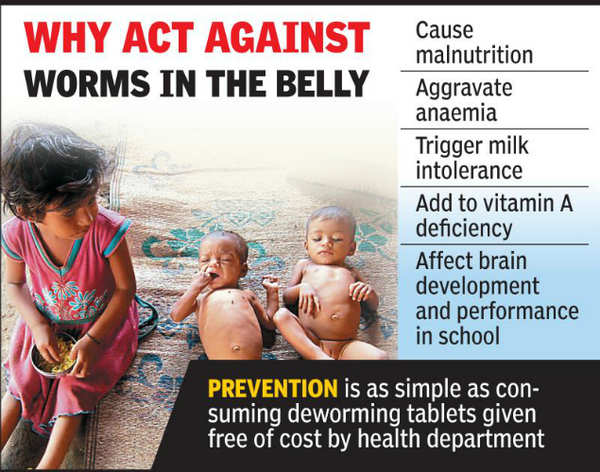- News
- City News
- lucknow News
- Worms in belly cause malnutrition, hit brain
Trending
This story is from February 23, 2019
Worms in belly cause malnutrition, hit brain
Over 40% of 22 crore kids and teens with worms in their stomach in India are from Uttar Pradesh, reveals a state health department data.

Prevention is as simple as consuming deworming tablets given free of cost by health department
LUCKNOW: Over 40% of 22 crore kids and teens with worms in their stomach in India are from Uttar Pradesh, reveals a state health department data. This translates into over 9.5 crore children in the 1-19 age-group in UP. Ahead of national deworming day on February 25, health officials said worms in the stomach were responsible for almost one third of total malnutrition in UP.

“Global studies show worms in the stomach trigger malnutrition,” said Dr Manoj Shukul, general manager, adolescent health, National health Mission, UP.
Citing global studies, experts said round worms (acaris lumbricoides) affect body’s ability to absorb fat and protein, besides worsening deficiency of Vitamin A and aggravating milk intolerance. Another study showed over 38% schoolchildren with worms in stomach were underweight while 58% were weaker than other kids of their age. Several African studies have noted the risk of malnutrition increases with each year of growth.
Informing that worms also affect a child’s performance in school, they said these tend to affect brain development. “Different aspects of cognitive development are affected as worms tend to aggravate iron deficiency and deprives the brain of necessary micronutrients,” they noted.
Experts said prevention was as easy as consuming a single tablet twice a year. “The tablet is administered free of cost on national deworming days. Parents must encourage children to take these pills in the interest of their healthy future,” said Dr Shukul.

“Global studies show worms in the stomach trigger malnutrition,” said Dr Manoj Shukul, general manager, adolescent health, National health Mission, UP.
Citing global studies, experts said round worms (acaris lumbricoides) affect body’s ability to absorb fat and protein, besides worsening deficiency of Vitamin A and aggravating milk intolerance. Another study showed over 38% schoolchildren with worms in stomach were underweight while 58% were weaker than other kids of their age. Several African studies have noted the risk of malnutrition increases with each year of growth.
As per an Indian Council of Medical Research, National Institute of Epidemiology study, prevalence of round worms in UP was found to be 70% while another 22% carried hook worms in their stomach. Around 4% children were found to be carrying whip worm (Trichuris Trichiura).
Informing that worms also affect a child’s performance in school, they said these tend to affect brain development. “Different aspects of cognitive development are affected as worms tend to aggravate iron deficiency and deprives the brain of necessary micronutrients,” they noted.
Experts said prevention was as easy as consuming a single tablet twice a year. “The tablet is administered free of cost on national deworming days. Parents must encourage children to take these pills in the interest of their healthy future,” said Dr Shukul.
End of Article
FOLLOW US ON SOCIAL MEDIA










